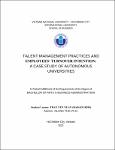| dc.description.abstract | One of the limitations in the implementation of the university autonomy policy is that
universities have not yet ensured the effectiveness of talent management, leading to the
increase in employee turnover recently. Even though they have implemented certain TM
practices, they are focusing less on TM as a strategic strategy for employee retention. To
address this gap, this research was conducted to measure the impact of TM practices on the
employee’s turnover intention in autonomous universities. Based on four theories (equity
theory, expectancy theory, Herzberg's two-factor theory, and social exchange theory), the
author proposed the research model with a total of 6 variables. The independent variables
included talent acquisition, learning and development (L&D), and compensation; while the
dependent variable was the turnover intention. In addition, the relationship between TM
practices and employees’ turnover intention was expectedly mediated by employees’ job
satisfaction and moderated by employee voice. The sample of this study was 211
employees at thirteen autonomous universities in Ho Chi Minh City. The research findings
indicated that L&D and compensation practices positively affected employees’ turnover
intention through the mediating role of job satisfaction. Meanwhile, talent acquisition
showed an insignificant impact and employee voice did not moderate the relationship
between employees’ job satisfaction and turnover intention. This study made two
contributions to the area of human resources: theoretical and practical. The author intended
to expand the theories that explain the link between TM practices and employees’ turnover
intention, as well as deepen our understanding of this relationship in the context of
Vietnam. In addition, autonomous universities might be reminded that TM had the
potential to be a strategic instrument for the sustainable growth of the organization and its
workforce. | en_US |


